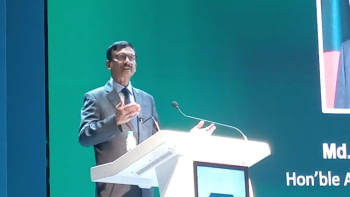Patriarchy plagues adivasi communities too
A study has found existence of patriarchal ideologies among the indigenous communities of Chittagong Hill Tracts in contrast to the general belief that indigenous societies are more gender equal.
Ainoon Nahar, professor of Anthropology department of Jahangirnagar University, yesterday presented an extract from her ongoing research "Contribution of unrecognised works of women in Chittagong Hill Tracts: Conceptualisation, Impact and Prospect", at the second session of a two-day programme organised by Manusher Jonno Foundation (MJF) on Bangla Academy premises in the capital.
The mainstream population has a tendency to stereotype the indigenous communities as matriarchal society and thus more gender equal, said Nahar, adding, "In fact there are no matriarchal (women leading) communities in Bangladesh, rather some of the communities are matrilineal (descent is traced through the mother)."
The study covered eight indigenous communities living in nine villages of six upazilas of Rangamati, Khagrachhari and Bandarban.
Both indigenous men and women, hold that women do not do any work, although the study found that rural indigenous women on an average spend 16-20 hours per day in housework, rearing cattle and fowls, farming, collecting food for slack periods and weaving clothes, said Nahar at the programme, marking the International Day of the World's Indigenous Peoples 2014.
Since men own most of the properties and sell the farm produce in the market, women's participation in economic activities is not recognised, she explained.
"Though indigenous women work both at home and in the field, they are not identified as Jum farmers like the men. Rather we call them labourers," said Tuku Talukder, executive director of Rangamati-based women's rights organisation Himawanti.
Anna Minj, director, Community Empowerment, Integrated Development, Brac, said farm work and weaving is a part of the growing up process of the indigenous communities and the idea of working outside home was pioneered by the indigenous women.
Prof Naseem Akhter Hussain, the Government and Politics department of JU, said," Recognising women's work is related to women's empowerment, dignity and rights to property."
Quoting popular agricultural show's presenter Shaikh Siraj, MJF Executive Director Shaheen Anam said women perform 17 out of 22 tasks involved in farming, starting from planting seeds to bringing the crops home, yet they view these work as house chores.
She talked about MJF's recent endeavour to calculate the economic value of women's unrecognised works and to find out its contribution to the Gross Domestic Product of the country.
Once women's work is valued and recognised, women would be respected and it might reduce violence against women in the society, she hoped.

 For all latest news, follow The Daily Star's Google News channel.
For all latest news, follow The Daily Star's Google News channel. 



Comments